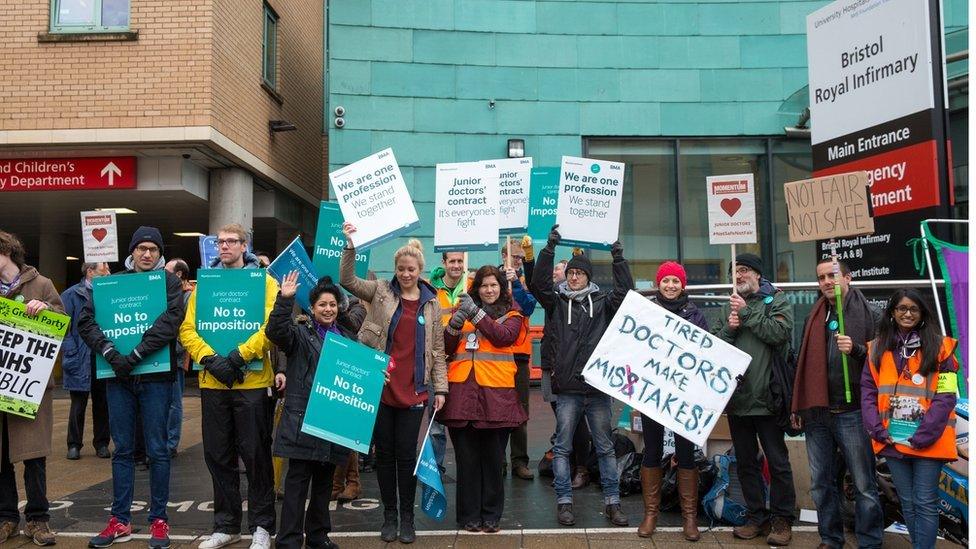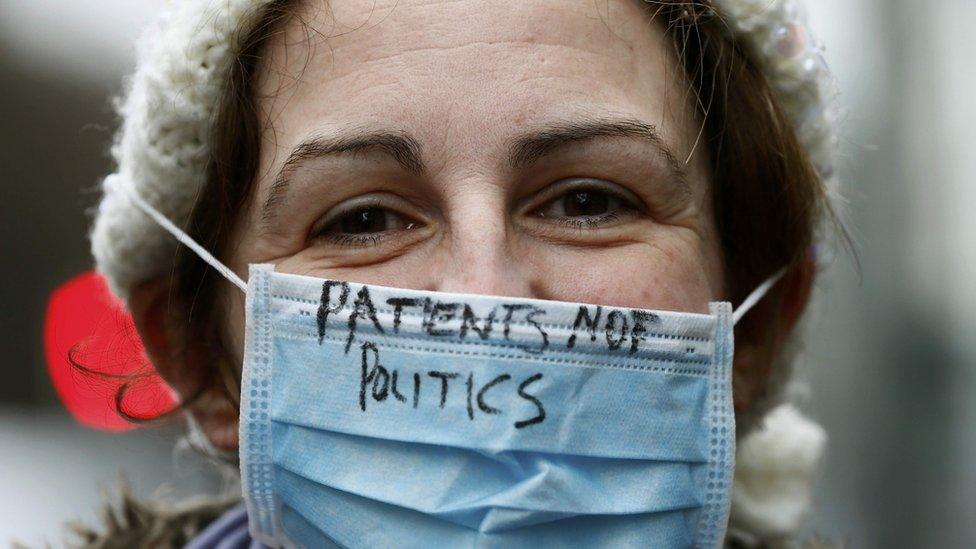Junior doctors dispute - poised for escalation
- Published

This was the fourth walkout by junior doctors
Striking doctors are returning to work for now and the placards are being put away.
The fourth round of strike action at hospitals in England has taken place. But there seems no prospect of any imminent return to talks.
The two sides in this acrimonious dispute, the government and the British Medical Association, seem firmly entrenched. There is a general assumption that the planned all-out strike by junior doctors at the end of April, the first in NHS history, will inevitably take place.
Disputes involving strike action are often punctuated by talks.
But, since the Health Secretary Jeremy Hunt announced in February that a new contract for junior doctors in England would be imposed from August, there has been no contact between the two sides.
Recriminations are rife. Trust has been fractured. Mr Hunt and NHS Employers are adamant that they went the extra mile to try to get a deal, offering better terms than previously put forward for doctors working one weekend in four or more.
They argue that, after months of negotiations, the BMA refused to discuss the outstanding issue of Saturday pay - and that therefore imposing a new contract was unavoidable.
The BMA says junior doctors did not have confidence in the new contract because of fears that safeguards against excessive working hours would prove ineffective.
Once the government had pressed on with imposing the contract, argues the BMA, there was no choice left but to continue with the strikes.
Union members are deeply sceptical about the ability of the government to fund its "seven day NHS" policy.
Doctors, backed by some leaders in the medical profession, have suggested the contract discriminates against women because of its treatment of part-time workers.
They have highlighted a phrase in the Department of Health's own Equality Impact Assessment: "Any indirect adverse effect on women is a proportionate means of achieving a legitimate aim".
Government sources argue this was the sort of legal language familiar in this sort of technical impact assessment and not evidence of a fundamental flaw.
Deep concern
There has been comment on the figures for the proportion of junior doctors working on strike days.
The first day of action in January saw 39% of junior doctors reporting for work, which included those covering emergencies and urgent care and who were therefore not on strike.
On Wednesday this week, the first day of this 48 hour stoppage affecting routine care, that number had increased to 46%, though it was down to 42.5% on Thursday.

Some have argued that those figures suggest a drift back to work.
The BMA points out that this week saw junior doctors changing their hospital attachments and so those affected would have felt obliged to attend induction courses. NHS England, which produces the figures, says it won't speculate on whether there is any trend or explanation.
There's pressure on both sides to get back round the table.
The Academy of Medical Royal Colleges has called on the government to drop imposition of the contract, and the BMA to cancel the next strike.
At the highest levels of the medical profession there is deep concern about the failure to resolve the dispute and the prospect of junior doctors walking out of emergency as well as routine care.
All roads
Some Royal College leaders have been meeting Jeremy Hunt in recent days. They have repeated their calls for another effort to restart talks.
I understand they have been given the message that the government will not reconsider its stance and the new contract will be introduced.
Mr Hunt wants them to know how much he feels he has been prepared to compromise already.
The junior doctors, meanwhile, are adamant that their protest action continues, including demonstrations in Jeremy Hunt and David Cameron's constituencies in the weeks ahead.
All roads lead to the unprecedented escalation of strike action on April 26th and 27th - and uncharted territory for doctors, ministers and the NHS.